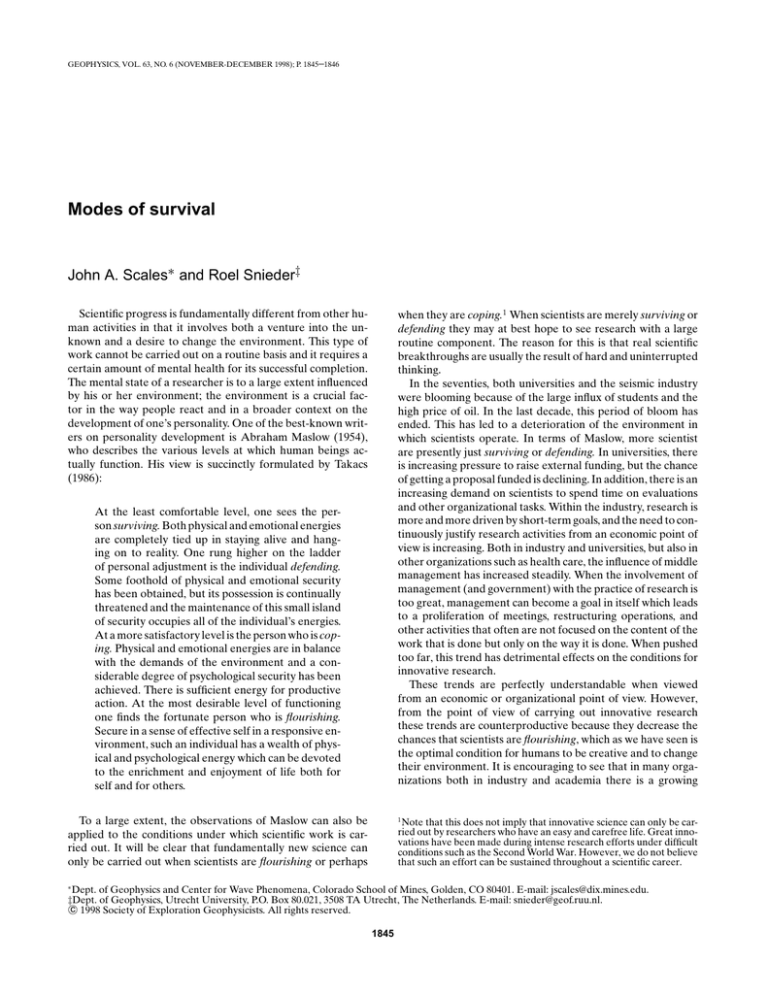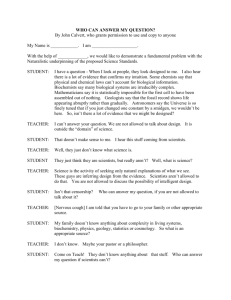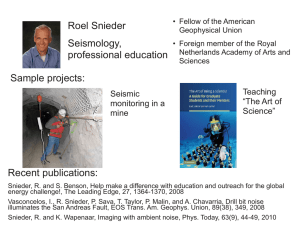Modes of survival John A. Scales and Roel Snieder
advertisement

GEOPHYSICS, VOL. 63, NO. 6 (NOVEMBER-DECEMBER 1998); P. 1845–1846 Modes of survival John A. Scales∗ and Roel Snieder‡ when they are coping.1 When scientists are merely surviving or defending they may at best hope to see research with a large routine component. The reason for this is that real scientific breakthroughs are usually the result of hard and uninterrupted thinking. In the seventies, both universities and the seismic industry were blooming because of the large influx of students and the high price of oil. In the last decade, this period of bloom has ended. This has led to a deterioration of the environment in which scientists operate. In terms of Maslow, more scientist are presently just surviving or defending. In universities, there is increasing pressure to raise external funding, but the chance of getting a proposal funded is declining. In addition, there is an increasing demand on scientists to spend time on evaluations and other organizational tasks. Within the industry, research is more and more driven by short-term goals, and the need to continuously justify research activities from an economic point of view is increasing. Both in industry and universities, but also in other organizations such as health care, the influence of middle management has increased steadily. When the involvement of management (and government) with the practice of research is too great, management can become a goal in itself which leads to a proliferation of meetings, restructuring operations, and other activities that often are not focused on the content of the work that is done but only on the way it is done. When pushed too far, this trend has detrimental effects on the conditions for innovative research. These trends are perfectly understandable when viewed from an economic or organizational point of view. However, from the point of view of carrying out innovative research these trends are counterproductive because they decrease the chances that scientists are flourishing, which as we have seen is the optimal condition for humans to be creative and to change their environment. It is encouraging to see that in many organizations both in industry and academia there is a growing Scientific progress is fundamentally different from other human activities in that it involves both a venture into the unknown and a desire to change the environment. This type of work cannot be carried out on a routine basis and it requires a certain amount of mental health for its successful completion. The mental state of a researcher is to a large extent influenced by his or her environment; the environment is a crucial factor in the way people react and in a broader context on the development of one’s personality. One of the best-known writers on personality development is Abraham Maslow (1954), who describes the various levels at which human beings actually function. His view is succinctly formulated by Takacs (1986): At the least comfortable level, one sees the person surviving. Both physical and emotional energies are completely tied up in staying alive and hanging on to reality. One rung higher on the ladder of personal adjustment is the individual defending. Some foothold of physical and emotional security has been obtained, but its possession is continually threatened and the maintenance of this small island of security occupies all of the individual’s energies. At a more satisfactory level is the person who is coping. Physical and emotional energies are in balance with the demands of the environment and a considerable degree of psychological security has been achieved. There is sufficient energy for productive action. At the most desirable level of functioning one finds the fortunate person who is flourishing. Secure in a sense of effective self in a responsive environment, such an individual has a wealth of physical and psychological energy which can be devoted to the enrichment and enjoyment of life both for self and for others. To a large extent, the observations of Maslow can also be applied to the conditions under which scientific work is carried out. It will be clear that fundamentally new science can only be carried out when scientists are flourishing or perhaps 1 Note that this does not imply that innovative science can only be carried out by researchers who have an easy and carefree life. Great innovations have been made during intense research efforts under difficult conditions such as the Second World War. However, we do not believe that such an effort can be sustained throughout a scientific career. ∗ Dept. of Geophysics and Center for Wave Phenomena, Colorado School of Mines, Golden, CO 80401. E-mail: jscales@dix.mines.edu. ‡Dept. of Geophysics, Utrecht University, P.O. Box 80.021, 3508 TA Utrecht, The Netherlands. E-mail: snieder@geof.ruu.nl. ° c 1998 Society of Exploration Geophysicists. All rights reserved. 1845 1846 Scales and Snieder realization that management should not be more than the means to serve a goal. We do not want to make the point that scientists should be pampered; it is important that they be held accountable for their work, and a healthy competition keeps scientists on the cutting edge. However, there are more and more elements in the present system that severely reduce the mental level at which scientists must operate. This is a negative development both for the people involved and for scientific progress in general. It is therefore important that we develop working environments that allow scientists to flourish, but which are also sufficiently flexible to deal with the economic and other demands from the organization. Realizing this balance is a task of formidable proportions for those who manage scientists. REFERENCES Maslow, A., 1954, Motivation and personality, Harper and Row. Takacs, C. A., 1986, Enjoy your gifted child: Syracuse Univ. Press.






